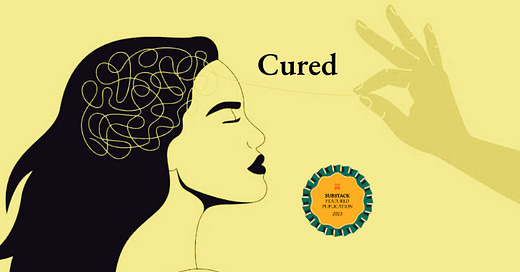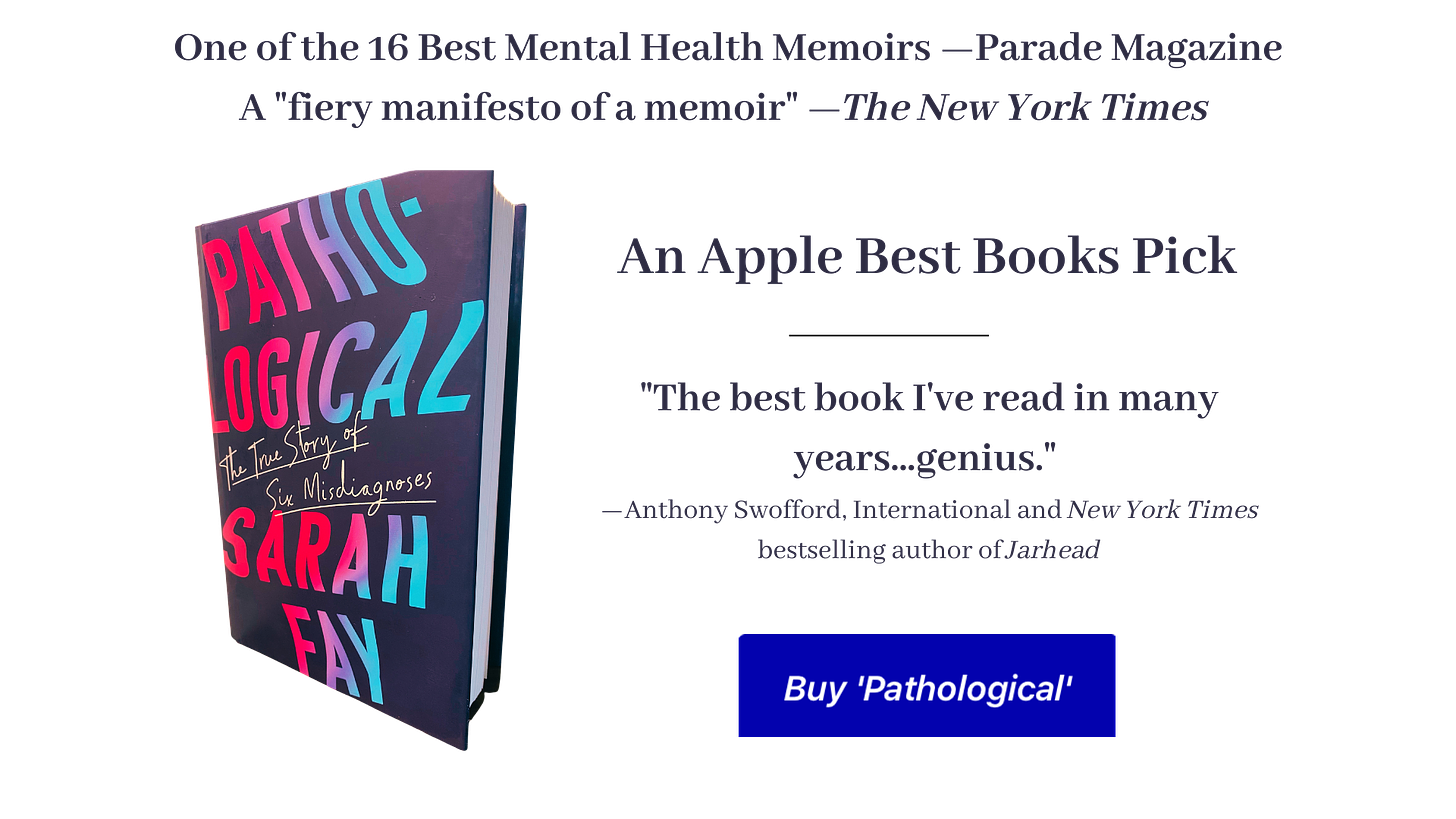🎧 Listen to Sarah read this chapter above or on Spotify:
If you haven’t already purchased access to Cured for $30—about the price of a hardcover book—you can do so here:
A few evenings after the On Our Own of Maryland Conference—where I’ve discovered that many, many people have recovered and are recovering from mental illness—I sit at my computer, researching recovery and peer support. It’s painful to discover that recovery is an actual stage of mental illness that many people suffering from psychic and emotional distress transition into. More painful is that there’s a whole community—a lifeforce—dedicated to it. There’s been a we out there all this time.
A fly has gotten into the apartment, and Siddhi is on the hunt. Siddhi moves his body at warp speed (for him) onto the counter and off, onto the kitchen table and off, onto the sofa, and up his cat tree. Twenty minutes later, he’s still at it. It’s like watching Ahab go after the white whale. Siddhi clumsily dashes from one end of the apartment to the other, meowing, lunging, and leaping at the fly. He won’t give up.
I’ve just finished reading Thomas Insel’s Healing: Our Path from Mental Illness to Mental Health. In it, Insel writes that mental illness isn’t chronic and declares that the future of mental health is the recovery model and peer support. During his time at the NIMH, he was known as “America’s psychiatrist.” To have someone with such authority tell us that it’s time to let those of us who’ve experienced mental illness recover is revolutionary. The recovery community and the lessons it has to teach psychiatry, families, and the public are key.
Siddhi comes barreling through the living room. I can’t see the fly he’s after, but he does. And that’s all that matters.
I start researching Peer Support Specialists. In their contemporary form, Peer Support Specialists have been around since the 1980s and 1990s. It’s taken nearly half a century, but mainstream medicine, psychiatry, and policy have finally started to see their value.
In a couple of months, I’ll enroll in my first Peer Support Specialist training course and understand why. The facilitator will explain the primary role of a Peer Support Specialist: to model recovery by sharing the parts of our experience that might help the person.
Peer Support Specialists don’t give advice. We listen and support—hence the name Peer Support. We’re there to draw them out, to help them establish goals, exercise decision-making skills, and develop action plans. Our role is to listen and guide as the client (or consumer) comes up with practical ways to improve wellness in all aspects of their lives: emotional, financial, social, spiritual, occupational, physical, intellectual, and environmental. We empower—we don’t instruct—and appreciate of every step they take (“baby steps” is a degrading term).
Ideally, we join the clinician and care team. Non-diagnosed clinicians and staff are experts in treating a mental health condition; we’re experts in living with and overcoming a mental health condition. Sometimes, we provide support when the staff doesn’t believe in people with mental illness.
In working with someone with mental illness, we listen to their self-talk, their possible goals, and the barriers they think prohibit them from achieving them. It’s about finding out their thoughts, emotions, and behaviors without using technical language (like self-talk, goals, and barriers). In this, we play various roles:
Motivator and cheerleader
Ally and confidant
Truthteller
Role model and mentor
Resource broker
Community organizer
Lifestyle consultant
Advocate
Friend
Assistant in goal building
Collaborator in establishing overall wellness
(I tried to be all of these to myself; it barely worked.)
What amazes me most about peer support is that diagnoses aren’t mentioned. As Pat Deegan puts it: “We can never and must never reduce a person to being a diagnosis.” As a peer support specialist, diagnoses don’t matter. We aren’t clinicians and don’t pretend to be. All that matters is where the person is in the process of recovery and what we can do to help. We talk about experience, emotions, thoughts, their home and environment, if they have work and purpose, their personal medicine (including psychotropic drugs but also whatever else helps—walking, listening to music, playing with their dog), their social support network of family and friends. We help a person stop using a diagnosis to limit themselves.
In the stages of recovery, we have different jobs. In stage 1, we refer them to services that can help them decrease distress and symptoms. In stage 2, we instill hope and a sense of possibility, along with ways to improve their self-image. In stage 3, we (gently) encourage the person to see their lives as limitless. In stage 4, we help them identify their strengths in terms of skills, resources, and supports. In stage 5, we help them build self-trust and take full responsibility for their lives.
Throughout, we try to bring them from hopelessness to hope. As Deegan writes in Recovery: The Lived Experience of Rehabilitation, “All of the polemic and technology of psychiatry, psychology, social work, and science cannot account for this phenomenon of hope. But those of us who have recovered know that this grace is real. We lived it. It is our shared secret.”
*
There’s warmth in the group on the first day of my Mental Health Peer Support Recovery Specialists training. Our facilitator speaks slowly. It’s comforting. He tells us that the training will be intense, personal, and fun and that it’s a privilege for him to guide us through this process of becoming Mental Health Peer Support Specialists.
This is one of many courses I’m taking for certification to support those with mental illnesses as they move toward recovery. One course is eighty hours; the other is one hundred and ten hours plus three hundred hours of an internship. This course is partly self-directed, culminating in an intensive series of workshop days; the other meets every Saturday for seven hours for months and then sends us out to work with mental health organizations, where we meet with clients, helping them define their definition of recovery, assisting them in developing a plan, and giving them resources. Other courses are three days or two days or a few hours long. The Depression and Bipolar Support Alliance (DBSA) runs this certification. A local university holds classes for the other.
The government fully funds the university program. Tuition is waived, and the internship is paid. As many in positions of authority, including Tom Insel, have said, peer support is the future of mental health. It’s the answer to all those community centers that were never built. Who better to help those struggling with mental health conditions and substance abuse issues (both much more encouraging ways of referring to people in crisis and in challenging situations) than those who’ve been where they are? Who better to set them on a path to recovery instead of a lifetime in the mental health system?
The problem is that our mental health system is designed to keep people in treatment, and peer recovery support specialists and the recovery model are still in the nascent stages of being integrated. In the university course, the professors discuss the mental health system’s response to the recovery model and peer support. They warn us about what we’ll face when we set out to work with an organization. Likely, organizations will try to have us do paperwork, which isn’t what we’re there for. It’s not an insult; it’s just that without systemic change on a state and national level, the role of peer support specialists is a bit ambiguous. We’re left to convince others—one organization at a time—of the value of peer support and the role we can play.
To move away from the biomedical model, which entails a clinician seeing people for fifteen or thirty minutes and prescribing psychotropic medications and maybe recommending some form of therapy, to a recovery model, which views healing as the end goal and assists people in developing a personal treatment plan as the way to get there, will require a systemic shift unlike any our mental health system has seen. Institutions and organizations will have to accept that healing isn’t just possible but the goal. They’ll need to see mental health treatment, particularly for those with serious mental illness, as a three-step process: pre-recovery support (awareness of where to get help and options for assistance), treatment (peer recovery & other means), post-treatment (recovery support services, including checkups, monitoring, transitioning).
This shift in thinking has been met with resistance from pharmaceutical companies, biopsychiatrists, clinicians, insurance agencies, and legal institutions. Aside from the profit-motive aspects, change is hard for individuals, let alone systems, institutions, organizations, and the public at large.
In both trainings, the people there to become Peer Support Specialists are of all races, ethnicities, genders, religions, and socio-economic backgrounds. Many are veterans, primarily because the Veteran’s Administration has been at the forefront of adopting the recovery model and peer support into its services.
We then talk about our relationship with peer support. Some have been working in peer support for years. Many work for the VA or want to work for the VA. Some want to start their own nonprofits. A few had the benefit of peer support in their recovery. We all want to give back by helping others in the mental health system understand that recovery is possible before it’s too late for them.
Getting a formal certification is a relatively new thing. There are various levels: human-to-human peer support (i.e., no formal certification), some sort of credential, and state and national certification. To even test for state and national certification, you must complete one hundred and ten hours of coursework and two to three thousand hours of work experience.
We go around and share our experience of recovery—briefly. Not one of us heard the word recovery when we first entered the mental health system.
Their experiences and the fact that they recovered astounds me and fills me with admiration: foster care, homelessness, diagnoses, psychoses, hospitalizations, addictions. They speak of loneliness, despair, and frustration. One woman cries as she tells of how she hurt her family, and I want to tell her I understand. Some have had milder experiences: struggles with depression or anxiety or obsession and compulsions or distractibility, limited quality of life, inability to achieve their goals or take pleasure in what used to bring them joy.
The facilitator says that it’s time to turn our story into a dynamic skill set that will help others.
For the third time in my recovery (the first being when my psychiatrist said he didn’t know what diagnosis to give me, the second upon hearing that one of his patients had fully healed and gone on to become an executive at Google when I thought mental illness was lifelong), I feel a shift.
“You’re going to move from an illness story to a wellness story.”
Mine has been an illness story. Finally, I get to leave that behind and be of service to others—all without ever having to work at Google.
*
I don’t worry about “getting sick again”—whatever that means. There will be depression and panic attacks. (I also get migraines and don’t see them as a sign that something is chronically wrong.) Unsettling, even excruciating anxiety will thrum in my chest for days. Certainly, I’ll ruminate and have insomnia and the sodden pit in my stomach will make it hard to eat. Or I’ll eat too much. I don’t know how I’ll process the grief I’ll feel after my parents’ deaths. During that time, I may need more help or enter a different type of treatment. But I will see it as temporary and my thoughts, feelings, and behaviors in context. I’ll never think of myself as a diagnosis and won’t fall into the trap of believing there’s no hope.
Around me will be those who’ve recovered, examples of what’s possible; their voices will be in my head.
» Continue to Chapter 41.







